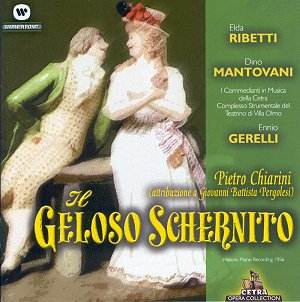This
was the world premiere recording of an opera previously attributed
to Pergolesi, Il Geloso Schernito. This comedy for two
protagonists is actually the fruit of Pietro Chiarini, a Northern
Italian opera composer. Listening to this mono recording brings
a distinct sense of nostalgia. It is all too easy to imagine what
a latter-day period group would make of it in terms of phrasing
and textural clarity, but that is to miss the point. This is a
valuable document of a period of rediscovery of lesser-known Italian
opera (as the excellent booklet notes point out). The recording
quality itself is in general perfectly adequate, although a rather
distanced harpsichord sounds rather curious.
The
two singers in this recording (identified by period-feel black-and-white
photos) both appear elsewhere in the catalogues: Ribetti most
famously in the Serafin Rome Opera Un ballo in maschera
(1949); Mantovani as Sciarrone in Maazel’s late 1960s Tosca.
So at the very least this disc helps to fill in a couple of gaps.
But both singers are in general in fine fettle and do all in their
power to bring the present comedy to life.
It
is easy to believe that Ribetti is also available in the role
of Zerlina on Warner Fonit’s Don Giovanni of 1953 (0927-43561-2).
Her voice has all of the lightness and freshness this role demands.
For
sense of timing and pure comedic delight, this opera put me in
mind of the (very much later, compositionally) I quattro rusteghi
by Wolf-Ferrari also available on this label (see my MusicWeb
review: 8573-87481-2). The orchestra, whilst not world-class,
clearly enters into the spirit of things. The Overture is characterised
by sprung rhythms that, admittedly, are not what we would refer
to as ‘authentic’ today. But the point is that the speed is convincing,
something that also can be said about the recitatives (of which
there are many), which are naturally paced so that interchanges
flow along naturally.
The
plot is rather like having half of Così fan tutte,
with disguises between lovers, farcical chaos and a final resolution.
Lasting less than an hour in toto, though, there is not
much time to dwell on things – only three tracks rise above the
four-minute mark, and one of them is the Overture!
As
with Così, there is the test of fidelity by the
removal of the beloved and the use of disguise. The various machinations
of Part Two, where Masacco returns in disguise to tempt Dorina
with a precious jewel, are delightful. Again, Dorina is marvellously
coquettish in Part Three, but the orchestra’s tendency to drag
it’s feet can detract from one’s enjoyment. A similar fault blights
the Duet that precedes the final, jaunty chorus – the effect of
the tender vocal interchanges is obliterated by a turgid orchestral
coda.
Whatever
drawbacks there may be, this is certainly worth a spin. There
is an infectious feel to much of the piece that cannot but fail
to brighten one’s day.
Colin
Clarke
